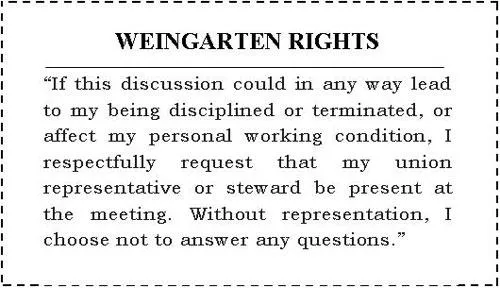Weingarten Rights

Every union-represented employee has rights that are protected by law. One advantage you have as a union member is the right to have a union representative with you when your employer asks you to answer questions that could lead to your discipline or employment termination.
The right to have a union representative with you during an “investigatory interview” is from the United States Supreme Court decision National Labor Relations Board v. J. Weingarten, Inc. The union member rights that are established by that decision are called Weingarten rights.
You may wonder why you would want or need a union representative in the room with you during an investigatory interview that could lead to your discipline or termination. What could go wrong? You’re a good worker and have nothing to hide!
There are many reasons why your Weingarten rights are important and you should feel free to exercise them whenever the need arises.
- You can consult privately with your union representative and receive advice before answering employer questions.
- Your union representative can serve as a witness to your answers and defend your version of the investigatory interview if necessary.
- Your union representative can ask the employer to clarify unclear or confusing questions on your behalf.
- Your union representative can raise contract language and other facts that may cause the employer to shorten or end the investigatory interview.
These are only a few of the reasons why it’s important to know that you can count on your union representative to help you through what is likely to be a stressful meeting with your employer.
STEP-BY-STEP PROCEDURES TO GET YOU THROUGH
1. As soon as the employer contacts you to ask questions about a matter that you think could result in your discipline or discharge, say that you want your union representative to accompany you. The employer does not have to raise this option with you unless your collective bargaining agreement requires that notification.In any case, it’s always best to say that you want your union representative to be with you in the interview.
2. When your union representative arrives, the employer must tell the representative what is being investigated.
3. You have the right to meet privately with your union representative before the investigatory interview.
4. During the investigatory interview, your union representative can make sure that the employer’s questions to you are clear and fair. They can also raise contract language and other facts to support you.
5. After the interview ends, your union representative can make arguments to the employer to support you and meet with you to discuss next steps.
WHAT IF THE EMPLOYER DOESN’T WANT TO CONDUCT THE INTERVIEW WITH MY UNION REPRESENTATIVE PRESENT?
While you have a right to have your union representative present during an investigatory interview, the employer is permitted by law to take one of three actions.
- The employer can grant your request.
- The employer can refuse your request and end the interview.
- The employer can ask you to choose whether you want to 1) have the interview without your union representative or 2) end the interview. We recommend that if the employer asks you to make one of these two choices, you choose to end the interview.
Note that the employer cannot refuse your request for a union representative when your collective bargaining agreement requires that your union representative be contacted and present for members who are called by the employer to an investigatory interview.
WHAT SHOULD I SAY TO THE EMPLOYER TO REQUEST MY UNION REPRESENTATIVE?
We recommend that you say the following to preserve your rights:
If this discussion could in any way lead to my being disciplined or terminated, or affect my personal working conditions, I respectfully request that my union representative, officer or steward be present at the meeting. Without representation, I choose not to answer any questions.
